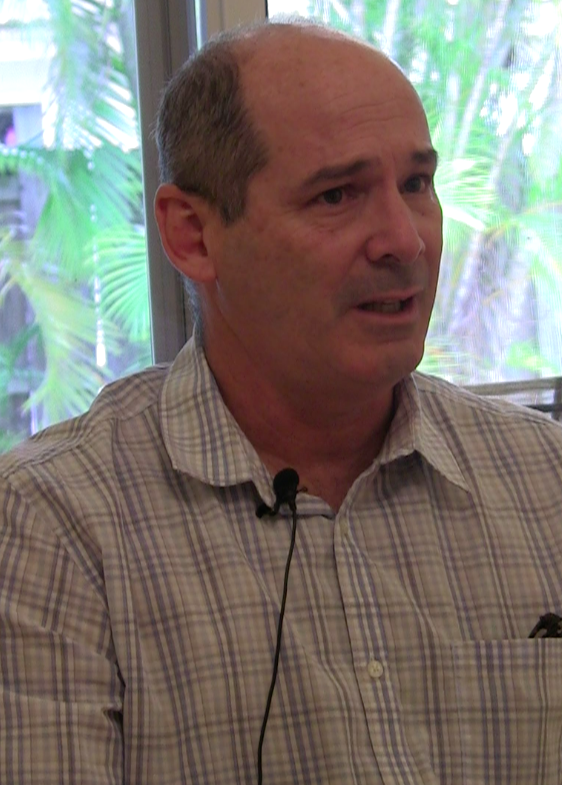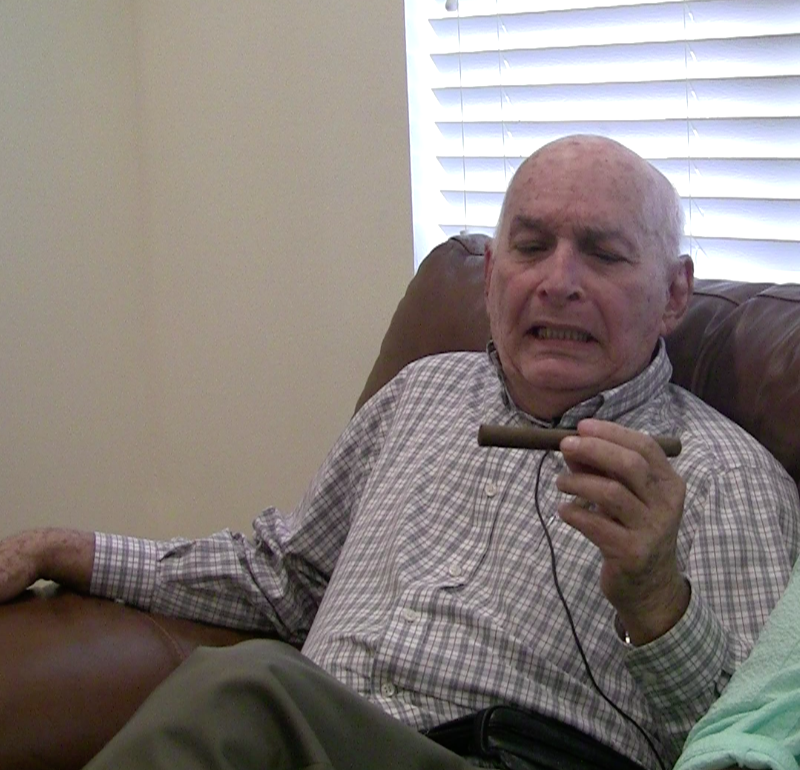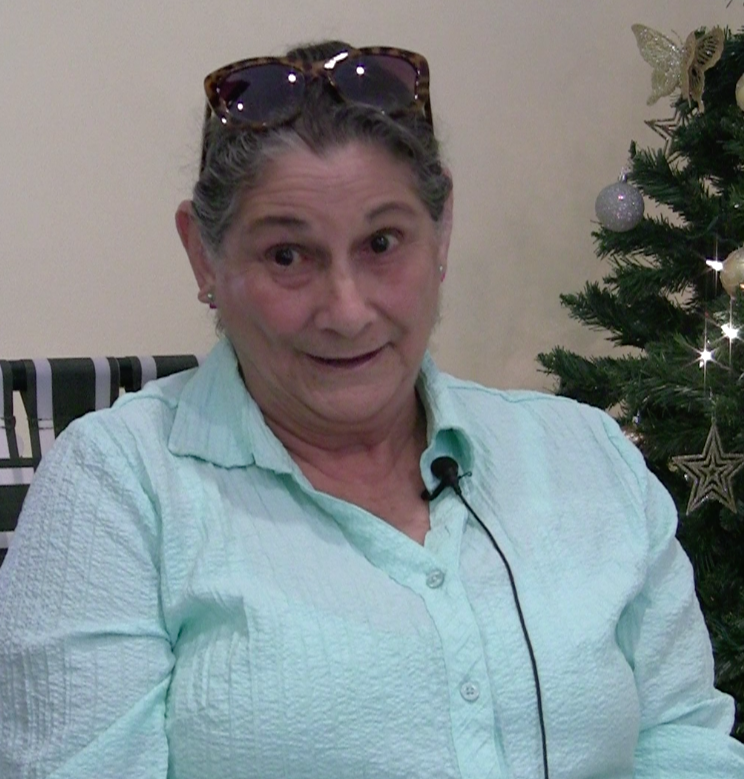The Pérezes: Perestroika Denied
As a young engineering trainee in Ukraine, Marvin Pérez caught a glimpse of Perestroika, only to have it cruelly denied back home in Cuba. In the second of a three-part series, we follow the Perezes story of serial exile.


The Pérez family having breakfast in their house in Kendall. From left to right: Claudia (Marvin’s daughter), Maira (Marvin’s wife), Marvin, Augusto (Marvin’s father), and Ana Maria (Marvin’s mother).
This is part two in a three part series. Part One, on the Martínez family, is here.
Last December, Marvin Perez invited me to his home north of Miami, in Kendall, for a Sunday morning breakfast of arepas and Cuban dark coffee, a tradition his family started when they arrived in from Caracas in February 2000.
We all sliced our arepas open and filled them with egg and cheese. Ana Maria Moros, Marvin’s 79-year-old mother, offered to prepare a plate for her husband, Marvin’s 77-year-old father, Augusto Perez. He declined in favor of coffee only. She had already eaten but helped herself to another arepa. Conversation quickly veered to the uselessness of renewing U.S. relations with Cuba and the absurdity of Venezuelan politics.

Marvin Pérez
After the plates were cleared, Marvin started to tell me about life in Cuba before his move to Caracas in 1993. Tears cut his voice.
“I have beautiful memories of the people there,” he said, recalling his work as an electrical engineer at a government shipyard in Cienfuegos. He nodded toward his daughter, Claudia, who, at 18, aspires to be a journalist and was taking her own notes beside me.
“The people I worked with there, they were beautiful people. But they differed with me. In their political views.”
Although it took his family many years to decide to leave Cuba, the move to get out of Venezuela came quickly — just one year after the Chavez victory in 1998.
The Pérezes are professionals. Like Marvin, his two brothers are engineers. His mother, now retired, was a chemistry teacher, and his father, a professor and researcher in physics.
Between 1981 and 1986, as the Soviet Union stagnated, Marvin Pérez studied electrical engineering at what is now the Eastern Ukrainian University in the city of Lugansk, then known as Voroshilovgrad. Under the arrangement, after graduation he had to go back to Cuba and work for the regime.
Towards the end of Marvin’s time in the Soviet Union, the need to modernize the country’s crumbling economy became unmissable, leading to the initial Perestroika reforms under Mikhail Gorbachev. Until his Soviet sojourn, Perez had never questioned his country’s communist system. But he then found himself nursing the hope that Cuba, too, would ride a similar “wave of change.”
What he found on return was the opposite.
“Instead of riding the [reformist] wave, the government distanced itself from it more and more,” he said. The once close relationship between Cuba and the Soviet Union cooled. Castro was openly critical of Gorbachev’s reform efforts and of his impulse towards political democracy. Castro was also aware that the USSR’s ailing economy would mean a slowdown in the assistance on which Cuba relied.
In a speech that Castro gave in 1989, when Gorbachev visited the island, he suggested that Cuba did not need the Perestroika measures because it was different “in size, ethnic diversity and history” from the USSR, and because it did not have to surmount the legacy of terror left by Stalin. “Unless you consider me a kind of Stalin,” he was quoted as saying jovially.

Augusto Perez
Marvin also found that his father’s work in physics at the Institute of Havana had been stymied. He wasn’t allowed to attend conferences or communicate with scientists in other parts of the world.
“I was isolated, in essence, for ideological reasons,” Augusto said, raising his eyebrows. Only sporadically did Augusto let his guard down, like he did when I pointed to the two Cuban cigars that were peeking out of his shirt pocket.
“I haven’t always liked smoking” he said, smiling and taking the cigars out to show me, “But about one year ago I started smoking one cigar every Sunday.”
Augusto’s prospects at work darkened even further when the authorities caught Marvin and one of his brothers a mile off-coast of Cuba in a desperate and “rather immature” attempt to flee the country, as Marvin now puts it. It was 1992. The Soviet Union had collapsed and Cuba had gone into what was euphemistically called the Período Especial, a time of severe economic crisis and high levels of repression. The longstanding American embargo and the collapse of the Soviet Union had cast the country into chaos.
In this climate of repression, leaving Cuba without permission was a punishable offense. Marvin and his brother were detained. The trials lasted one month. Since the government did not find evidence that they intended to “steal” any government property to take abroad (basically anything would be considered as such, but they threw themselves into the sea with nothing) they were freed.
But they lost their jobs. The blow immediately hit their family. Augusto was continually insulted by his bosses and peers, and gradually lost access to research tools. Finally, he quit, or as he put it, was “indirectly fired,” and started driving a cab.

Ana María Pérez
Marvin’s mother Ana Maria, was working in the Education Ministry. Her chemistry textbooks were used in schools throughout the country. But after the raft episode, she quit her job “for ethical reasons,” she said. She did not want to work for the government any more.
She started corresponding with a cousin in Venezuela to arrange her children’s migration. Soon, the cousin filed family reunification papers. With the tips Augusto received from tourists in dollars, he covered the exit permission fees. Months later, in December of 1993, Marvin and his brother boarded a plane to Caracas.
His first impressions were much like Madelin’s. Although he had lived outside of Cuba, he had never experienced capitalism.
“Everything impressed me,” he said, “The modern car that picked us up, the modern buildings, the Christmas decorations.” Cuba’s state-sanctioned atheism meant no national Christmas celebrations. Although Ana Maria remained a Catholic, she kept her faith secret to protect the family.
Marvin, his brother, and their parents who joined them four years later, became part of a small fourth wave of Cuban migrants who arrived to Venezuela in the 1990s. Unlike the Martinez family who arrived in the ‘80s, when the country was experiencing relative growth and openness to immigration, the Perez family was greeted by a Venezuela cast into chaos by a slump in oil prices, the instability of the CAP regime and the coup attempts of the year before.
As a result, Holly Ackerman explains in an essay, migration policies were stiffened and the inflow of Cubans slowed. Those who came did so mostly through family reunification, like the Perezes, or through unusual (and illegal) means. Some say that it was during that time that Castro found in Hugo Chavez a figure that he envisioned would take advantage of the crisis and fill the void the fall of the USSR had left.
In January of 1993, Pepsi-Cola Venezuela accepted Marvin’s application for a job in its factory. He worked on the bottling line. They sent him for training to Calabozo, a small rural city about four hours’ drive from Caracas.
It was in his first months in the Venezuelan plains that Marvin remembers first experiencing the fluctuations of a free economy. His first paycheck in the Venezuelan currency- Bolívar- was equivalent to 700 dollars and the second one, only one month later, was worth a hundred dollars less.
“I was impressed. I had never seen devaluation or inflation,” he said. “There was no such thing in Cuba.”
Marvin struggled the first years. “You have to learn to cope in such system,” he said. “Socialist systems are paternalistic. They give you everything, in very small quantities, but everything.” But still, he delved into the rural culture of los llanos. He listened to someone play the harp for the first time, danced to the rhythm of música llanera and went to any number of cock fights.
He was soon sent to Maracay, about two hours away from Caracas, where he had cousins and where, after a couple of months, he moved in with Maira, his future wife. In 1997 their first daughter Claudia was born, they got married, and Marvin’s parents emigrated from Cuba to join them.
“I was desperate to reunite with my children,” Ana Maria told me with tears in her eyes.
Augusto said they assimilated quickly.
“It was an extraordinarily similar feeling between the Cuban character and the Venezuelan one,” he said. “And the cultural life was similar to Cuba’s before Fidel.” Yet, a man in his late 50s, he was not able to find full-time work. Ana Maria started taking massage courses.
“I thought that if I didn’t work as a teacher, I needed to do something else,” she said. But only three months later, she started teaching at a high school. Two years later, Chavez rose to power.
“They say that if history doesn’t repeat itself, it rhymes,” Marvin said. The Perez were not going to wait.
“We Cubans,” Marvin said, “had already lived what you Venezuelans still had to live.”
Marvin said to his friends, ojo pelao whenever they talked about politics. Augusto did so too.
“But ideological processes always have an enthusiastic and utopian initial period, even for the most sensible and well-intentioned people,” he said. Ana Maria, too, tried to make her coworkers see that despite the fact that Chavez won by election and not by revolt, as Castro had, his ideas had the same glimmer.
Fausto Masó, a a well-known Caracas journalist and analyst, took a position similar to Ana Maria’s when we met last December at Caracas’ Café Arábica, where businessmen and intellectuals often meet for breakfast. Masó migrated from Cuba to Venezuela in the 1970s. He said Venezuela was nothing like Cuba because the government did not need such radicalism, and that Chavez was nothing like Fidel, because he did not need to be. For one thing, Venezuela had oil money that permitted Chavez to enact leftist policies without imposing a huge financial burden on the population and for another, global realities had changed since the Cold War era.
Masó’s response was reminiscent of something Castro himself had said back in 1999, three weeks after Chavez won the elections.
“You cannot do what we did back in 1959,” he told an audience at the Central University of Venezuela. “You will have to be much more patient than us, and I’m referring to the part of the population that is craving immediate radical social and economic changes in the country. If the Cuban Revolution had triumphed in a moment like this one, it would not have been able to sustain itself.”
Still, what the Perez family heard, like did the Martinez, were the rumbles of impending loss of freedom. “We never ever imagined when we migrated to Venezuela that there would be such a political change,”Ana Maria said. “What you value the most in those situations is liberty. And I felt it. And that’s why we left Venezuela right away.”
Marvin left before the rest of the family to figure out how they would all migrate. Near the end of 1999, without knowing that he was eligible for emigration to the United States under the Cuban Adjustment Act, or that he could go to the Mexican frontier and ask for parole at the U.S. border booth, he crossed the Mexican border alone at Matamoros and walked over a bridge into Brownsville. The American authorities detained him for one month, until they sorted out that he was Cuban and sent him to Florida for court proceedings.
During his time detained in Brownsville he familiarized himself with the laws and told his parents and brothers to seek parole at the Mexican border, and his wife and daughter to enter as tourists and wait for him to obtain residency. By February 20, 2000, the whole family was in Miami.
After one year of court hearings, the judges offered him residency. He accepted, and extended the privilege to his wife and daughter. After jumping from installing rugs to wood floors to alarms, Marvin landed a job with Pepsicola in Orlando in 2002, again in their bottling factory. He worked there for six years until the 2008 housing crisis, when he decided it was a good time to buy a house in Miami where the rest of the family lived. By then, he and Maira had a second child, a son, whom they named after Marvin.
They moved to their house in Kendall and Marvin started working at his current job at New Era, a power generation company. His wife Maira got a job in the cafeteria of the school where they sent their children. Their son is now 11 years old and Claudia, 19.
Marvin was 29 when he made his second transition. He is now 52. He said the move to Miami from Venezuela was not so hard because Miami is such “an extension of Latin America. Here you can find croquetas cubanas and hallacas,” he said. They remain close to their Venezuelan connections—his wife’s family is there as are the godparents of their children and so many of their friends. Their last ties to Cuba are nearly gone. Almost no family remains there, save one maternal uncle.
When Augusto, the physicist, arrived in Miami, he started working at a Publix supermarket, moving the shopping carts. After a few years he started giving mathematics and physics lectures at Miami Dade College, where he still teaches. Ana Maria started as a teacher’s assistant and tutor for foreign students at South Miami Senior High but then began teaching chemistry at Miami Dade College. Although she adapted rapidly, migrating for the second time was not easy for her, “I never wanted to leave, I was always scared. Not Cuba. Not Venezuela. If my children wouldn’t have left, I would have stayed. I always think that I will not be able to cope with the change. I then face it, I would say with some degree of success, but I’m always scared beforehand. The same happened when I arrived in Caracas,” she said. ‘Where do we start working? What do we do?’”
The whole Perez family walked me to the door as I left. They stood outside the house and waved until they couldn’t see me any more, in the way my paternal grandparents have always said goodbye when we leave their home. They went with us to the door of their apartment and keep waving until the elevator left. When I was in elementary school, I recall my parents complaining that it was dangerous for them to wait outside their previous house for a long time. Crime in Caracas was already a big issue.
On my way back to my friend’s home where I was staying in Miami, I called my parents to ask if perhaps this long goodbye might be a Cuban tradition. They laughed. My dad suggested that it might be an immigrant thing,
“You know, of people who have experienced real farewells.” Maybe so, I thought, and remembered how hard it was for me to leave Caracas five years ago and how much I have always wanted to go back. This is not to compare my choice to pursue a career abroad to any of these migrants’ stories, but still, it was hard. Hard for my parents to let me go, hard to even think of the possibility of not going back.
I tried not to cling to the thought, because the uncertainty is a constant source of stress, and switched to recalling the summer afternoon I had spent with my grandfather in Caracas, piecing together the story of his parents’ escape from Poland to Cuba and then with him from Cuba to Venezuela. I thought of how hard it would be for him to migrate again.
Caracas Chronicles is 100% reader-supported.
We’ve been able to hang on for 22 years in one of the craziest media landscapes in the world. We’ve seen different media outlets in Venezuela (and abroad) closing shop, something we’re looking to avoid at all costs. Your collaboration goes a long way in helping us weather the storm.
Donate




